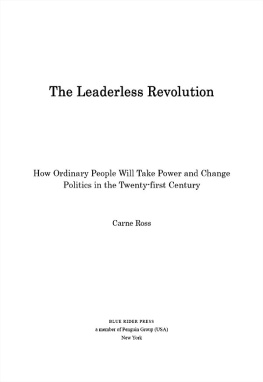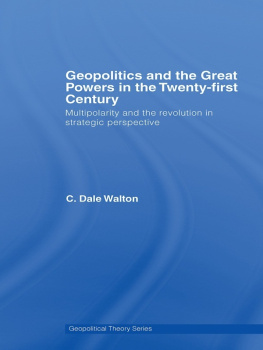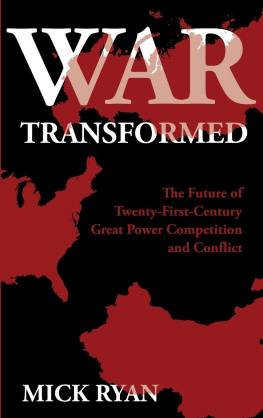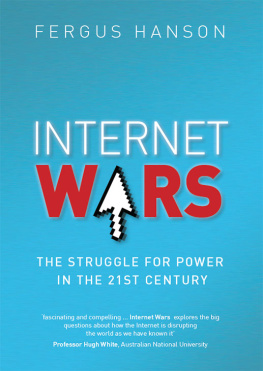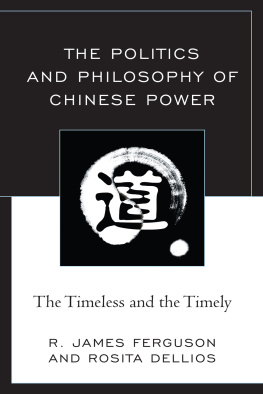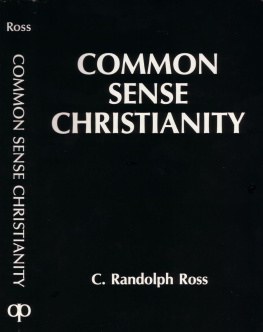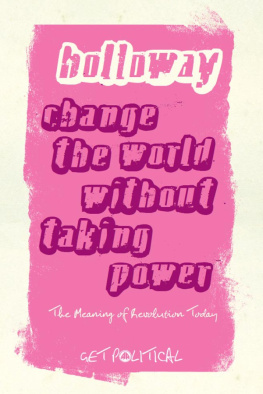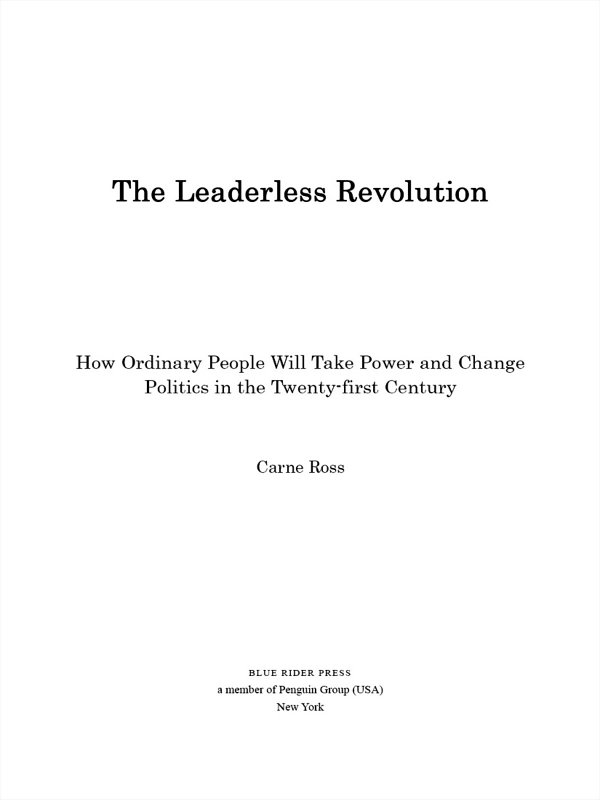The Leaderless Revolution
How Ordinary People Will Take Power and Change Politics in the Twenty-first Century
Carne Ross
BLUE RIDER PRESS
a member of Penguin Group (USA)
New York
B LUE R IDER P RESS
Published by the Penguin Group
Penguin Group (USA) Inc., 375 Hudson Street, New York, New York 10014, USA
Penguin Group (Canada), 90 Eglinton Avenue East, Suite 700, Toronto, Ontario M4P 2Y3, Canada (a division of Pearson Penguin Canada Inc.)
Penguin Books Ltd, 80 Strand, London WC2R 0RL, England
Penguin Ireland, 25 St Stephens Green, Dublin 2, Ireland (a division of Penguin Books Ltd)
Penguin Group (Australia), 250 Camberwell Road, Camberwell, Victoria 3124, Australia (a division of Pearson Australia Group Pty Ltd)
Penguin Books India Pvt Ltd, 11 Community Centre, Panchsheel Park, New Delhi110 017, India
Penguin Group (NZ), 67 Apollo Drive, Rosedale, North Shore 0632, New Zealand (a division of Pearson New Zealand Ltd)
Penguin Books (South Africa) (Pty) Ltd, 24 Sturdee Avenue, Rosebank, Johannesburg 2196, South Africa
Penguin Books Ltd, Registered Offices: 80 Strand, London WC2R 0RL, England
Copyright 2011 by Carne Ross
All rights reserved. No part of this book may be reproduced, scanned, or distributed in any printed or electronic form without permission. Please do not participate in or encourage piracy of copyrighted materials in violation of the authors rights. Purchase only authorized editions. Published simultaneously in Canada
While the author has made every effort to provide accurate telephone numbers and Internet addresses at the time of publication, neither the publisher nor the author assumes any responsibility for errors, or for changes that occur after publication. Further, the publisher does not have any control over and does not assume any responsibility for author or third-party websites or their content.
To I and C
War will be dead, the scaffold will be dead, frontiers will be dead, royalty will be dead, dogmas will be dead, man will begin to live.
Victor Hugo
The next revolution will not be televised.
Gil Scott-Heron
C ONTENTS
Preface: Guide to the Leaderless Revolution
Turning and turning in the widening gyre
The falcon cannot hear the falconer;
Things fall apart; the centre cannot hold;
Mere anarchy is loosed upon the world,
The blood-dimmed tide is loosed, and everywhere
The ceremony of innocence is drowned;
The best lack all conviction, while the worst
Are full of passionate intensity.
Things do not seem to be going as planned. The system is broken. Meant to bring order, it foments instead disorder. We need something new.
The end of the Cold War was supposed to presage the triumph of democracy and with it, stability. Globalization was supposed to launch everyone upon an eternally rising wave of prosperity. Some called it the end of history. But history has instead opened another, unpredicted, chapter.
While the opening of markets in India and China has released hundreds of millions from poverty, globalization has also triggered violent and uncontrolled economic volatility. Trillions of dollars shift from asset to asset (or from debt to debt), sometimes faster than a human can press a computer keyfor it is an algorithm that controls the trade. Banks and whole countries crash, almost without warning. Meanwhile, the gap between a tiny number of the very rich and everyone else has accelerated rapidly, in every region and in every country.
The profits of this modern economy flow to a minuscule minority that holds the wealth closely. Everyone elsethe middle class and the poorhave seen their incomes stagnate over the last decade or so. And stagnation in reality means decline, as food and energy prices, driven by rising shortage, have risen faster and faster. And for those in the bottom 10 percent, incomes have declined in absolute, as well as relative, terms. Though they live cheek by jowl with the rich and share the same cities, the poor are getting poorer. In New York City, one in five children is dependent on food stamps for survival.
In every profession and trade, global competition means that jobs and careers once thought of as safe are no longer. Industries that have stood for generations can collapse in a few years. Only two classes can now look forward to a secure retirement: the rich and those working for government.
The promise of capitalism seems more and more hollow. As its benefits are ever more unevenly shared, it has created a culture that cherishes much that is worst in human nature. Too much modern work is demeaning or humiliating, or simply boring. Little offers meaning.
In the exhausting yet often banal race to get ahead or at least to make ends meet, there is little time for others, for the community that seems ever more fractured, or for an ever more poisoned planet. Nature is no more, there is only what we have made of it. As The Economist recently put it, we live in the Anthropocene era: an Earth primarily formed by man.
Despite the dismal familiarity of these problems, credible solutions are hard to come by. Celebrities launch simplistic single issue campaigns, absurdly claiming that an e-mail to a representative will solve the problem. Each new cohort of politicians offers to fix this malaise, but they are less and less believed including, one suspects, by themselves (for they too can sense the mounting unease). Indeed, the political class now appears more part of the problem than the solution. Even politicians now complain about politicians.
In Britain, politicians and media crow over the humbling of press baron Rupert Murdoch, but barely admit that both estates were grossly corrupted by him, and for decades. In Washington, needless political bickering has managed to worsen Americas debt problemand increase the cost paid, eventually, by all Americans. Washington has become synonymous with ugly partisan argument and deadlock.
In democratic systems, it has become evident what is more obvious in autocraciespower is monopolized by the powerful. In the U.S., corporate lobbyists far outnumber legislators (there are now lobbyists for the lobbying industry). Legislation is sometimes created simply for political parties to extract rents from corporate interests. Big business donates to all parties, careful to ensure that their interests are protected whichever prevails. For it is still money that wins elections, and it is still large corporations that contribute the most.
In the 2008 credit crunch, irresponsible and untransparent lending by banks and inadequate legislation (loosened by well-funded lobbying of both U.S. parties) combined to wreak massive and lasting damage on the world economy, affecting the poorest most of all. But despite this disaster, there is little sign of effective rules, national as well as global, judged by impartial experts as effective.
Banks lobby country by country to water down regulation, arguing that national competitiveness will be underminedeven though all the biggest banks operate in many markets at once. And at the international level, as so often is the case, governments are unable to agree on anything but the lowest common denominator, and even then often fail to implement itas is clear with the so-called Basel III rules, which are claimed to bring banks back under control. In another equally important forum, after years of elaborate multitracked negotiations involving thousands of delegates in hundreds of meetings, there remains little prospect of international agreement on the necessary measures to limit carbon emissions.

